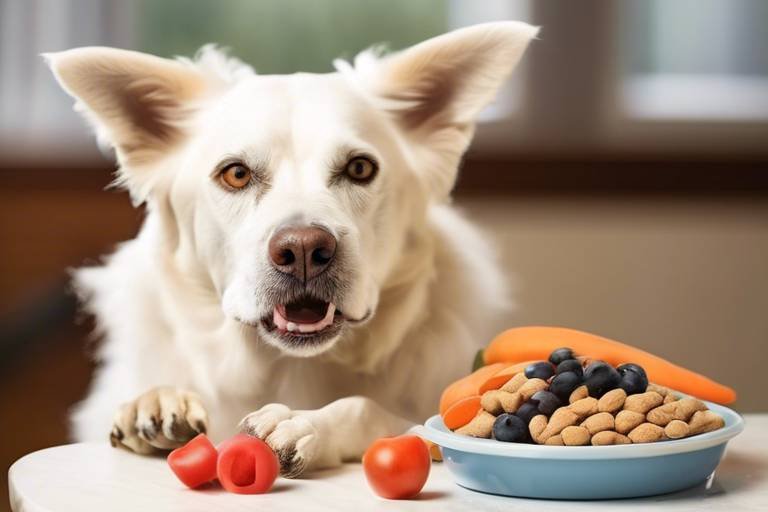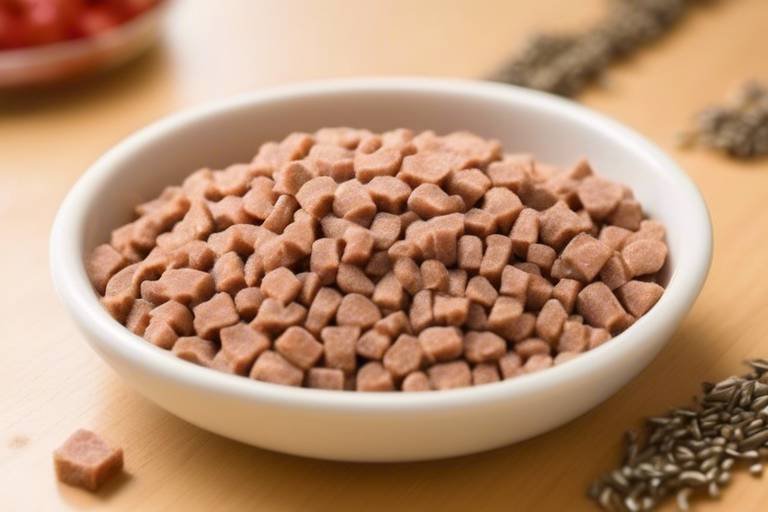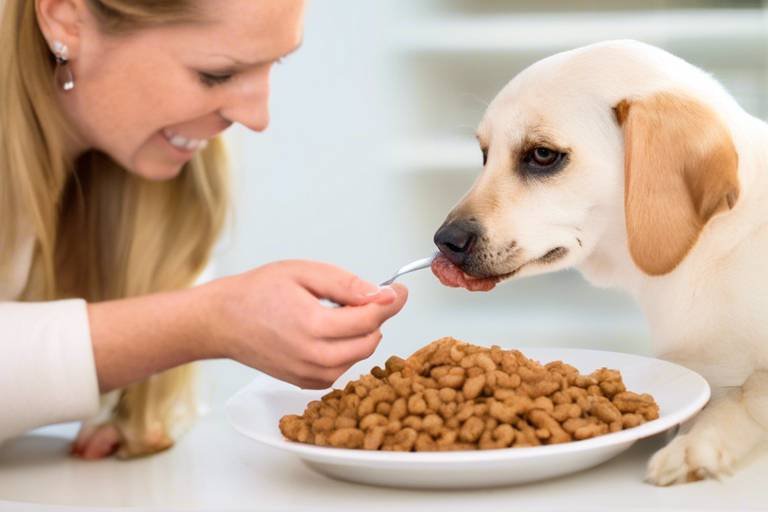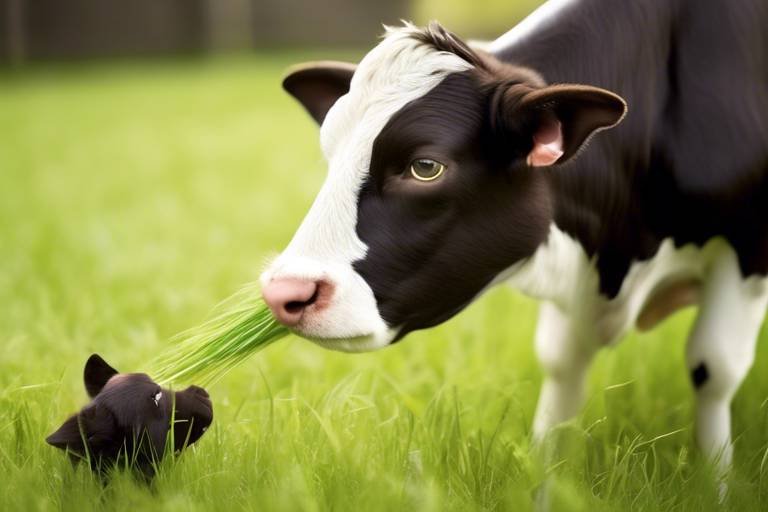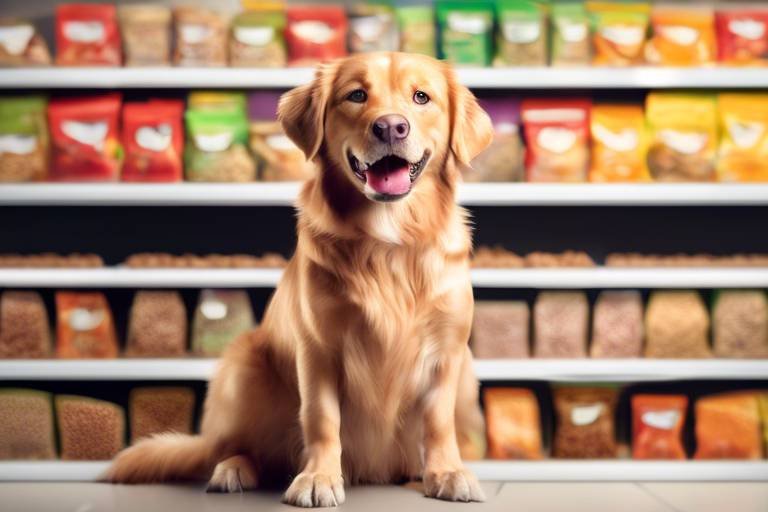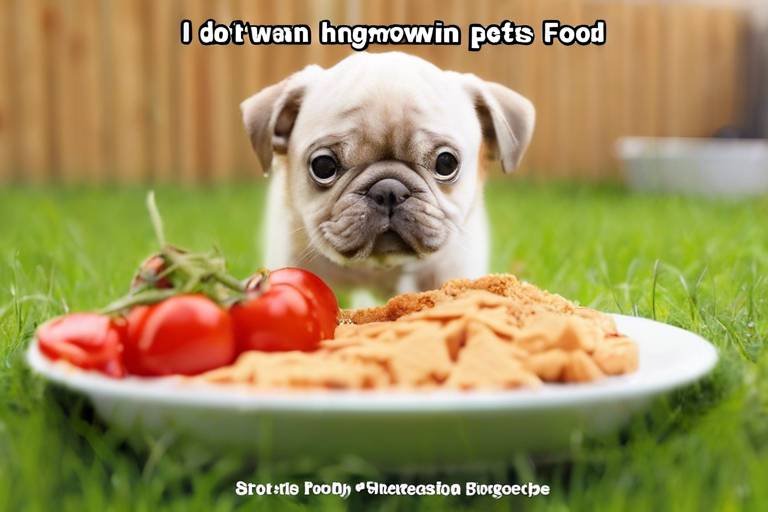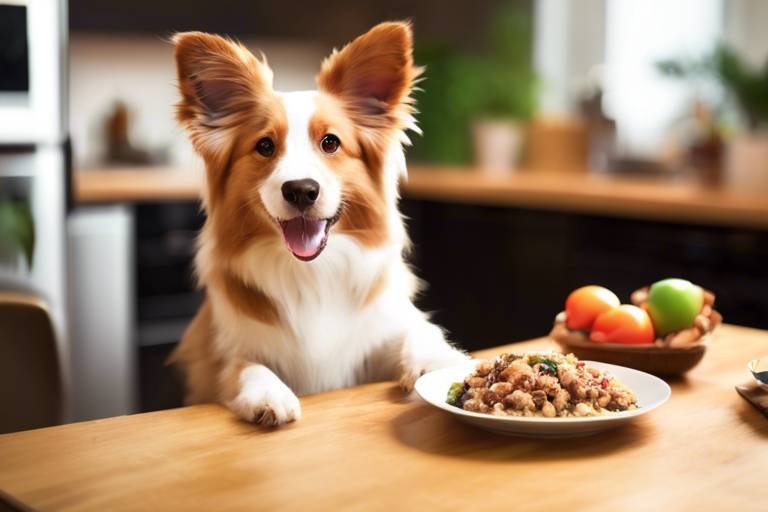How to Maintain a Healthy Diet for Senior Dogs
As our beloved furry friends age, their dietary needs shift significantly, just like how our own nutritional requirements change over time. Maintaining a healthy diet for senior dogs is not just about feeding them; it’s about ensuring they live a vibrant and fulfilling life. With the right balance of nutrients, you can help your senior dog enjoy their golden years with energy and joy. But what exactly should you focus on when it comes to their diet? Let’s dive into the essentials!
Senior dogs have unique nutritional requirements that differ from younger dogs. As they age, their metabolism slows down, and they may become less active. This means their bodies require fewer calories but more of certain nutrients to support their health. It's crucial to understand these needs to provide a balanced diet that supports their health and vitality. Think of it this way: just like how a fine-tuned sports car needs premium fuel to perform at its best, your senior dog requires high-quality ingredients to thrive.
When it comes to selecting the appropriate dog food, it's vital to consider several factors. Ingredients, age-specific formulas, and dietary restrictions should all play a role in your decision. You wouldn’t want to fuel your car with low-grade gasoline, right? Similarly, your senior dog deserves the best! Look for dog foods specifically formulated for seniors, as these are designed to meet their unique needs.
High-quality protein, healthy fats, and essential vitamins are key ingredients to seek in senior dog food. Understanding these components helps ensure a balanced and nutritious diet for aging pets. Here’s what to keep an eye out for:
- Protein Sources: Senior dogs benefit from easily digestible protein sources like chicken, fish, and lamb. These proteins help maintain muscle mass and overall health as dogs age.
- Healthy Fats: Incorporating healthy fats, such as omega-3 fatty acids, can improve joint health and coat condition in senior dogs. These fats are essential for maintaining energy levels and overall vitality.
Just as important as knowing what to include in your dog's diet is understanding what to avoid. Certain ingredients can be harmful to senior dogs, such as fillers, artificial preservatives, and high levels of carbohydrates. These can lead to obesity and other health issues. Always read the labels and steer clear of anything that sounds more like a chemistry experiment than food!
Proper portion control is essential for senior dogs to prevent obesity and related health problems. Understanding feeding guidelines can help maintain a healthy weight and overall well-being. Remember, just because your dog gives you those puppy eyes doesn’t mean they need extra treats!
Portion sizes for senior dogs should be based on their weight, age, and activity level. Adjusting portions accordingly can help manage their weight effectively. If your dog is less active, it’s time to cut back on the food a little. Think of it like adjusting the volume on your favorite song; sometimes, less is more!
Adjusting feeding frequency can benefit senior dogs. Smaller, more frequent meals can aid digestion and provide consistent energy levels throughout the day. Instead of two large meals, consider splitting their daily intake into three or four smaller portions. This approach can help keep their energy steady and their digestive systems happy.
Regular health monitoring is crucial for senior dogs. Keeping track of their weight and any changes in behavior or appetite can help identify potential health issues early. Just like we keep an eye on our health, our pets need the same attention!
Recognizing signs of weight gain in senior dogs, such as difficulty in movement or increased lethargy, can prompt necessary dietary adjustments and veterinary consultations. If your dog seems less spry than usual, it might be time for a diet reevaluation.
Routine veterinary visits are essential for senior dogs to assess their health and dietary needs. Regular check-ups can help catch any issues early and adjust their diet accordingly. Think of your vet as the pit crew for your dog’s health – they’ll keep everything running smoothly!
For pet owners interested in preparing homemade meals for their senior dogs, understanding nutritious recipes and safe ingredients is vital for ensuring a balanced diet. Making meals at home can be rewarding, not just for you but for your furry friend!
Homemade meals can provide better control over ingredients and cater to specific dietary needs. This option can enhance the quality of life for senior dogs with special requirements. Plus, who doesn’t love the idea of cooking for their best friend?
Knowing which ingredients are safe for senior dogs is crucial. Foods like lean meats, vegetables, and whole grains can create balanced meals that support their health. Just remember to keep it simple and avoid any harmful foods like onions or chocolate!
In addition to a balanced diet, supplements can play a significant role in maintaining senior dogs' health. Understanding which supplements to consider can enhance their quality of life. Think of supplements as the cherry on top of an already great meal!
Supplements like glucosamine and chondroitin can support joint health in senior dogs. These can help alleviate discomfort and improve mobility in aging pets. It’s like giving their joints a little extra love and care!
Essential vitamins and minerals can boost overall health in senior dogs. Supplementing their diet with these nutrients can help address deficiencies and support their immune system. After all, a healthy dog is a happy dog!
Q: How often should I feed my senior dog?
A: It’s generally recommended to feed senior dogs smaller meals more frequently throughout the day to aid digestion and maintain energy levels.
Q: What are the signs that my senior dog is overweight?
A: Signs include difficulty moving, excessive lethargy, and a noticeable change in their waistline. Regular weigh-ins can help track their weight.
Q: Can I give my senior dog homemade food?
A: Yes! Just ensure you’re using safe ingredients and providing balanced nutrition to meet their needs.

Understanding Nutritional Needs
As our furry companions age, their bodies undergo a variety of changes that affect their nutritional requirements. Senior dogs, typically classified as those over the age of seven, have unique dietary needs that differ significantly from their younger counterparts. It's essential to recognize these differences to provide a balanced diet that supports their health, vitality, and overall quality of life. One of the primary changes in senior dogs is their metabolism, which tends to slow down. This means they may require fewer calories, but their need for certain nutrients becomes even more critical.
In general, older dogs need a diet rich in high-quality proteins to help maintain muscle mass, which naturally declines with age. Additionally, they require increased levels of fiber to aid digestion and prevent constipation, a common issue among senior pets. Furthermore, essential fatty acids, particularly omega-3s, can provide anti-inflammatory benefits that are crucial for joint health and mobility. This shift in nutritional needs can be likened to how our own dietary requirements change as we grow older; just as we might seek out foods that support our health, so too should we adjust our senior dogs' diets to cater to their evolving bodies.
Moreover, it's vital to consider any health issues that may arise as dogs age. Conditions such as arthritis, kidney disease, and obesity are prevalent in senior dogs, and their diets should be tailored accordingly. For instance, if a dog suffers from arthritis, foods rich in glucosamine and anti-inflammatory properties can be beneficial. On the other hand, dogs with kidney issues may require a diet lower in protein and phosphorus. This highlights the importance of consulting with a veterinarian to create a personalized nutrition plan that addresses specific health concerns.
In summary, understanding the nutritional needs of senior dogs involves a comprehensive approach that considers their age, health status, and lifestyle. By focusing on high-quality ingredients, appropriate calorie levels, and essential nutrients, pet owners can help ensure that their aging companions enjoy a long, healthy, and happy life.

Choosing the Right Dog Food
When it comes to feeding our senior dogs, the food we select plays a pivotal role in their overall health and happiness. As our furry friends age, their bodies undergo various changes that necessitate a shift in their dietary needs. It's not just about filling their bowls; it's about providing them with the nutrients that will keep them vibrant and active. So, how do you choose the right dog food for your beloved senior pup?
First and foremost, it's essential to consider age-specific formulas. Many pet food brands offer specialized diets tailored for senior dogs, which often contain a balanced blend of nutrients designed to support aging bodies. These formulas typically have lower calories to help manage weight, which is crucial since senior dogs are generally less active. They also often include added fiber to aid digestion, which is a common concern in older dogs.
Next, let's talk about ingredients. High-quality dog food should list real meat as the first ingredient, such as chicken, beef, or fish. This ensures your dog gets the necessary protein for muscle maintenance. Additionally, look for healthy fats like omega-3 fatty acids, which are fantastic for joint health and can contribute to a shiny coat. A good rule of thumb is to avoid foods that contain fillers like corn or soy, as these provide little nutritional value and can lead to weight gain.
Another critical aspect is to be aware of any dietary restrictions your dog may have. Just like humans, dogs can develop allergies or sensitivities as they age. If you notice your dog experiencing digestive issues or skin irritations, it might be time to reassess their diet. Consulting with your veterinarian can help identify the best food options tailored to your dog's specific needs.
To make the right choice, consider creating a comparison table of different dog food brands, focusing on their ingredients, nutritional content, and price. This can help you visualize which options might be best for your dog. Here's a simple example:
| Brand | Main Protein Source | Key Features | Price |
|---|---|---|---|
| Brand A | Chicken | Senior formula, high fiber | $50 for 30 lbs |
| Brand B | Salmon | Omega-3 rich, grain-free | $60 for 25 lbs |
| Brand C | Lamb | Hypoallergenic, low fat | $55 for 28 lbs |
In conclusion, choosing the right dog food for your senior dog is a multifaceted decision that requires careful consideration of their unique needs. By focusing on age-specific formulas, high-quality ingredients, and any dietary restrictions, you can ensure your furry friend enjoys a healthy, happy life well into their golden years.
- What should I look for in senior dog food? Focus on high-quality protein, healthy fats, and specific formulations for senior dogs that cater to their unique nutritional needs.
- Can I switch my senior dog's food suddenly? It's best to transition gradually over a week or so to avoid digestive upset.
- Are homemade diets suitable for senior dogs? Yes, but ensure they are balanced and meet all nutritional requirements.
Ingredients to Look For
When it comes to feeding our beloved senior dogs, selecting the right ingredients is paramount. As dogs age, their bodies undergo various changes, and their nutritional needs shift accordingly. Therefore, it's essential to focus on ingredients that promote health and longevity. High-quality protein, healthy fats, and a range of essential vitamins should be the cornerstones of their diet.
First and foremost, protein is crucial for maintaining muscle mass and overall body function. Senior dogs require easily digestible protein sources to support their aging bodies. Look for dog foods that list real meat, such as chicken, fish, or lamb, as the first ingredient. These protein sources not only provide the necessary amino acids but also help in keeping your furry friend active and sprightly.
In addition to protein, healthy fats play a vital role in senior dogs' diets. Fats are a concentrated source of energy and are essential for maintaining healthy skin and a shiny coat. Omega-3 fatty acids, in particular, are known for their anti-inflammatory properties, which can significantly benefit joint health. Including sources like fish oil or flaxseed oil in their diet can help alleviate discomfort from arthritis and keep them moving comfortably.
Don't forget about essential vitamins and minerals. Senior dogs need a balanced intake of nutrients to support their immune system and overall well-being. Look for dog foods fortified with vitamins A, C, and E, along with minerals like calcium and phosphorus. These nutrients not only enhance their health but also contribute to a better quality of life as they age.
To summarize, here are some key ingredients to look for in senior dog food:
- High-quality protein (chicken, fish, lamb)
- Healthy fats (omega-3 fatty acids)
- Essential vitamins (A, C, E)
- Minerals (calcium, phosphorus)
By keeping an eye on these ingredients, you can ensure that your senior dog receives a balanced and nutritious diet tailored to their specific needs. Remember, a well-nourished dog is a happy dog, and providing them with the right food can help extend their golden years!
Q: How much protein should senior dogs have in their diet?
A: Senior dogs typically require a diet that consists of at least 18% protein. However, it's essential to consult your veterinarian for personalized recommendations based on your dog's specific health needs.
Q: Are there any specific foods I should avoid for senior dogs?
A: Yes, avoid foods with fillers, artificial preservatives, and high levels of carbohydrates. These can lead to obesity and other health issues.
Q: Can I feed my senior dog homemade meals?
A: Absolutely! Just ensure that the meals are balanced and include the necessary nutrients. Lean meats, vegetables, and whole grains can make excellent homemade meals for senior dogs.
Protein Sources
When it comes to feeding our beloved senior dogs, protein is a critical component of their diet. As dogs age, their bodies undergo various changes, and they require easily digestible protein sources to maintain their muscle mass and overall health. Choosing the right protein is not just about filling their bowls; it’s about ensuring they thrive in their golden years.
Among the best protein sources for senior dogs are chicken, fish, and lamb. These proteins are not only rich in essential amino acids but also tend to be easier on the digestive system. For instance, chicken is a fantastic option because it is lean and packed with nutrients. Fish, particularly varieties like salmon and sardines, are excellent for their omega-3 fatty acids, which promote healthy skin and coat, while also supporting joint health. Lamb, on the other hand, is a great alternative for dogs with food sensitivities, providing a novel protein source that can help prevent allergic reactions.
Here’s a quick overview of these protein sources:
| Protein Source | Benefits |
|---|---|
| Chicken | Lean, digestible, and rich in nutrients. |
| Fish | High in omega-3 fatty acids, supports skin, coat, and joint health. |
| Lamb | Great for dogs with food sensitivities, provides novel protein. |
It’s important to note that not all protein sources are created equal. While some may be more appealing to your furry friend, others could lead to digestive issues or allergies. Always observe how your dog reacts to different proteins and consult your veterinarian if you notice any adverse effects. Additionally, consider rotating protein sources to provide a variety of nutrients and keep mealtime interesting.
Incorporating these protein sources into your senior dog’s diet can significantly enhance their quality of life. Not only will they enjoy their meals more, but they will also benefit from the essential nutrients that support their aging bodies. Remember, a well-fed dog is a happy dog!
- What is the best protein source for senior dogs? Chicken, fish, and lamb are excellent options as they are easily digestible and provide essential nutrients.
- How much protein should a senior dog have? The amount of protein can vary based on the dog's weight, age, and health status. It's best to consult with your veterinarian for personalized recommendations.
- Can I mix different protein sources in my dog's diet? Yes, mixing different protein sources can provide variety and a broader range of nutrients, but introduce new proteins gradually to avoid digestive upset.
Healthy Fats
When it comes to our beloved senior dogs, are not just a luxury; they are a necessity. As dogs age, their bodies undergo various changes, and incorporating the right types of fats into their diet can make a significant difference in their overall health and well-being. Think of healthy fats as the oil that keeps the engine running smoothly. They provide energy, support cell structure, and are crucial for absorbing certain vitamins. So, what types of fats should we be focusing on for our aging furry friends?
One of the most beneficial sources of healthy fats for senior dogs is omega-3 fatty acids. These essential fats can be found in fish oil, flaxseed oil, and even certain algae-based supplements. Omega-3s are known for their anti-inflammatory properties, which can help in managing joint pain and stiffness—common issues faced by older dogs. Imagine your dog feeling spry and energetic again, thanks to the magic of these healthy fats!
In addition to omega-3s, omega-6 fatty acids also play a vital role in a senior dog's diet. Found in ingredients like chicken fat and sunflower oil, omega-6s help maintain a healthy coat and skin, which can become dry and flaky as dogs age. A shiny coat is not just a sign of beauty; it also indicates that your dog is receiving the right nutrients. However, it's essential to strike a balance between omega-3 and omega-6 fatty acids to avoid any potential health issues.
To illustrate the importance of these fats, consider the following table:
| Fat Source | Benefits |
|---|---|
| Fish Oil | Rich in omega-3 fatty acids, supports joint health, and reduces inflammation. |
| Flaxseed Oil | Provides omega-3s, beneficial for skin and coat condition. |
| Chicken Fat | Source of omega-6 fatty acids, helps maintain a healthy coat. |
| Sunflower Oil | Rich in omega-6s, promotes skin health and provides energy. |
In conclusion, incorporating healthy fats into your senior dog's diet is crucial for their vitality and longevity. Just like humans, dogs benefit from a balanced approach to nutrition, and healthy fats are a key component. So, when you’re selecting dog food or preparing homemade meals, always keep an eye out for these beneficial fats. They can provide the energy boost and health support your aging companion needs to lead a happy, active life.
- What are the best sources of healthy fats for senior dogs? Fish oil and flaxseed oil are excellent sources of omega-3 fatty acids, while chicken fat and sunflower oil provide omega-6 fatty acids.
- How much fat should I include in my senior dog's diet? It's best to consult your veterinarian for personalized recommendations based on your dog's specific health needs.
- Can too much fat be harmful to my dog? Yes, excessive fat can lead to obesity and related health issues, so it's essential to maintain a balanced diet.
Ingredients to Avoid
When it comes to feeding our beloved senior dogs, being mindful of what goes into their food is just as crucial as knowing what to include. As our furry friends age, their bodies become more sensitive, making it vital to avoid certain ingredients that could jeopardize their health. Fillers are one of the biggest culprits. Often made from low-quality grains or by-products, these fillers provide little to no nutritional value and can lead to weight gain and digestive issues. Instead of nourishing your dog, they merely fill their bellies without any real benefit.
Additionally, artificial preservatives like BHA, BHT, and ethoxyquin are commonly found in commercial dog foods. While they help to prolong shelf life, these chemicals may pose health risks, especially for senior dogs whose systems may struggle to process them. Opting for foods with natural preservatives, such as tocopherols (vitamin E), can be a safer choice.
Another ingredient to steer clear of is high levels of carbohydrates. Many dog foods are packed with grains like corn and wheat, which can spike blood sugar levels and contribute to obesity. Senior dogs often lead a more sedentary lifestyle, making it essential to control their carbohydrate intake. Instead, focus on foods rich in protein and healthy fats that can help maintain energy levels without the excess weight.
To sum it up, here’s a quick overview of ingredients to avoid in your senior dog's diet:
- Fillers (low-quality grains and by-products)
- Artificial preservatives (BHA, BHT, ethoxyquin)
- High levels of carbohydrates (corn, wheat)
By keeping these ingredients out of your dog's meals, you can help ensure they enjoy their golden years with the health and vitality they deserve. Remember, a little extra attention to their diet can go a long way in enhancing their well-being and longevity.
Q: How can I tell if my senior dog is overweight?
A: Look for signs such as difficulty in movement, visible ribs, and a lack of energy. Regular weigh-ins can also help monitor their weight.
Q: Should I consult my vet before changing my dog's diet?
A: Yes, it's always a good idea to discuss any dietary changes with your veterinarian to ensure they meet your dog's specific health needs.
Q: Are homemade diets better than commercial dog food?
A: Homemade diets can offer more control over ingredients, but it's essential to ensure they are balanced. Consulting a vet or a pet nutritionist is advisable.
Q: What supplements are good for senior dogs?
A: Common supplements include glucosamine for joint health and omega-3 fatty acids for coat and skin health. Always check with your vet before adding supplements.
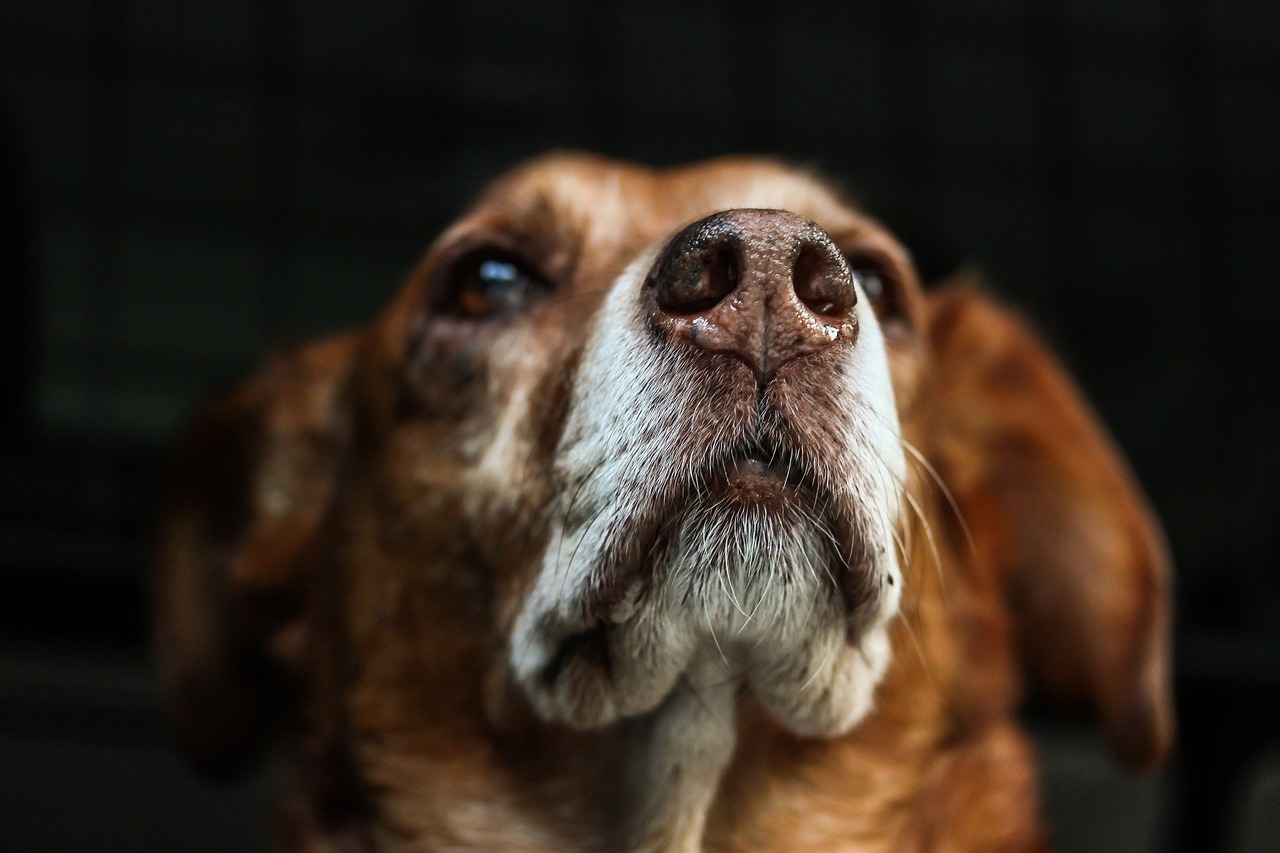
Portion Control and Feeding Guidelines
When it comes to our beloved senior dogs, portion control is a critical factor that can significantly impact their overall health and longevity. Just like humans, as dogs age, their metabolism slows down, which means they require fewer calories to maintain a healthy weight. This makes it essential for pet owners to be vigilant about how much food they are giving their furry companions. But how do you determine the right amount? Well, it largely depends on a few key factors including their weight, age, and activity level.
For instance, a senior dog that is relatively active will require more calories than one that spends most of the day lounging on the couch. Generally, the recommended daily caloric intake can be calculated based on their weight. A rough guideline is that dogs should consume about 20 calories per pound of body weight for maintenance. However, this is just a starting point. It's crucial to monitor your dog's body condition score and adjust portions accordingly. If your dog is overweight, reducing their food intake gradually can help them shed those extra pounds without causing stress or discomfort.
Another aspect of portion control involves feeding frequency. Instead of offering two large meals a day, consider breaking their daily food allowance into smaller, more frequent meals. This approach can aid digestion and help maintain consistent energy levels throughout the day. Think of it like this: just as we often feel better when we eat smaller meals more frequently, so do our canine companions!
To make things easier, you can create a simple feeding schedule. Here's an example:
| Time | Meal |
|---|---|
| 8:00 AM | Breakfast |
| 12:00 PM | Lunch |
| 5:00 PM | Dinner |
By sticking to a routine, your senior dog will not only know when to expect their meals, but it can also help with their digestive health. Additionally, always keep an eye on their weight and adjust the portion sizes as necessary. If you notice that your dog is gaining weight, it might be time to cut back on the treats or adjust their meal sizes. Remember, it's better to make gradual changes rather than drastic ones.
Lastly, don't forget to consult your veterinarian about your dog's specific needs. They can provide tailored advice based on your dog's health history and current condition. After all, a little guidance can go a long way in ensuring your senior dog lives a happy and healthy life!
- How often should I feed my senior dog? It's generally recommended to feed senior dogs smaller, more frequent meals throughout the day rather than one or two large meals.
- What if my senior dog is overweight? If your dog is overweight, consult your vet for a tailored weight loss plan, which may include reducing portion sizes and increasing exercise.
- Can I give my senior dog treats? Yes, but be mindful of the quantity and choose healthy, low-calorie options to avoid unnecessary weight gain.
Determining Portion Sizes
When it comes to keeping our senior dogs healthy, determining the right portion sizes is absolutely essential. Just like us, dogs don’t have a one-size-fits-all approach to their meals. Factors such as their weight, age, activity level, and even health conditions play a significant role in how much food they should be eating. For instance, a senior dog that enjoys a leisurely life on the couch will require fewer calories than an active senior dog that loves to chase after squirrels in the park. Understanding these nuances can help you maintain their ideal weight and prevent obesity, which is a common concern in older dogs.
As a starting point, many pet food brands provide feeding guidelines based on your dog's weight. However, these are just general recommendations. It’s crucial to monitor your furry friend’s body condition and adjust their portions accordingly. A good rule of thumb is to check their ribcage; you should be able to feel the ribs without excessive pressure. If you can’t feel them, it might be time to cut back on the portions.
To make this process easier, here’s a simple table that outlines general portion sizes based on weight:
| Dog Weight (lbs) | Daily Food Amount (cups) |
|---|---|
| 10 - 20 | 1/2 - 1 |
| 21 - 40 | 1 - 1.5 |
| 41 - 60 | 1.5 - 2 |
| 61 - 80 | 2 - 2.5 |
| 81 - 100 | 2.5 - 3 |
Keep in mind that these amounts can vary based on the specific dog food you choose, as some brands are denser in calories than others. Always check the packaging for specific recommendations. Additionally, if your senior dog has special dietary needs, such as being overweight or having a medical condition, consulting with your veterinarian is a great way to tailor their portion sizes accurately.
Another effective strategy is to split their daily food intake into smaller, more frequent meals. This approach not only aids digestion but also keeps their energy levels stable throughout the day. Think of it like fueling a car; if you only fill it up once a week, it might sputter and stall, but regular refueling keeps it running smoothly. Similarly, smaller meals can help your senior dog maintain a healthy metabolism.
In summary, determining the right portion sizes for your senior dog involves a combination of understanding their unique needs, monitoring their condition, and adjusting based on their lifestyle. By being proactive and attentive, you can help ensure that your beloved pet stays healthy and happy well into their golden years.
- How often should I feed my senior dog? It's generally recommended to feed senior dogs two to three times a day, depending on their specific needs and preferences.
- What if my dog is overweight? If your senior dog is overweight, consult your veterinarian for a tailored diet plan and portion sizes to help them lose weight safely.
- Can I mix homemade food with commercial dog food? Yes, but it’s essential to ensure that the homemade food complements the nutritional content of the commercial food to maintain a balanced diet.
Feeding Frequency
When it comes to feeding senior dogs, frequency matters just as much as the type of food you choose. Unlike younger dogs, senior dogs often benefit from a more structured feeding schedule that caters to their changing metabolism and digestive health. As dogs age, their bodies may not process food as efficiently, which can lead to digestive issues if they eat large meals less frequently. Therefore, breaking their meals into smaller portions throughout the day can be a game-changer.
So, how often should you feed your senior dog? Generally, it’s recommended to feed them two to three smaller meals each day instead of one or two large ones. This approach helps keep their energy levels stable and supports better digestion. For example, if your dog typically eats a cup of food per meal, you might consider splitting that into two meals of half a cup each or three meals of one-third of a cup. This method not only aids in digestion but also helps prevent the uncomfortable feeling of being overly full, which can be particularly hard on aging stomachs.
It’s also wise to observe your dog’s behavior around meal times. If they seem anxious or overly hungry, it might be a sign that they need more frequent feedings. On the flip side, if they’re leaving food uneaten, it may indicate that their portions are too large. Adjusting the feeding frequency based on your dog’s appetite and health can lead to a more satisfying and comfortable eating experience.
In addition to meal frequency, consider incorporating snacks or treats between meals. Healthy, low-calorie snacks can provide a little extra nutrition and keep their spirits high. Just be sure to factor these into their overall daily caloric intake to avoid unintended weight gain. Remember, maintaining a healthy weight is crucial for senior dogs, as excess weight can lead to a host of health problems, including joint issues and heart disease.
To summarize, here are some key points to consider regarding feeding frequency for senior dogs:
- Feed smaller meals two to three times a day.
- Monitor your dog's appetite and adjust portions as needed.
- Incorporate healthy snacks between meals to enhance nutrition.
- Keep an eye on their weight to ensure they remain healthy.

Monitoring Health and Weight
As our furry friends age, monitoring their health and weight becomes increasingly important. Just like humans, senior dogs can face various health challenges, and keeping a close eye on their well-being can make a significant difference in their quality of life. Regularly checking their weight and observing any changes in behavior or appetite can help you catch potential health issues early. This proactive approach not only ensures that your dog remains happy and healthy but also strengthens the bond you share with them.
One of the first signs that something may be off with your senior dog is a change in weight. Weight gain can lead to a range of health issues, including diabetes, heart disease, and joint problems. Conversely, weight loss can indicate underlying health problems such as dental issues, digestive disorders, or even more serious conditions like cancer. Therefore, it's essential to recognize the signs of weight gain or loss, which can include:
- Difficulty in movement or increased lethargy
- Changes in eating habits
- Visible ribs or spine, indicating weight loss
- Increased panting or restlessness
To effectively monitor your dog's weight, consider weighing them at home regularly or during routine vet visits. A simple kitchen scale can do the trick for smaller dogs, while larger breeds may need to be weighed at the vet's office. Keeping a record of their weight can help you notice trends over time, allowing you to adjust their diet and exercise accordingly.
Regular vet check-ups are also crucial for senior dogs. During these visits, your veterinarian can assess your dog's overall health, recommend dietary adjustments, and suggest appropriate exercise routines. They may perform blood tests or other diagnostics to check for underlying conditions that could affect your dog's weight and health. It's essential to communicate any changes you've observed at home, as this information can guide your vet in making the best recommendations for your pet.
In summary, monitoring your senior dog's health and weight is not just about keeping them fit; it's about ensuring they enjoy their golden years to the fullest. By being vigilant and proactive, you can help your furry companion thrive and maintain a happy, active lifestyle.
Q1: How often should I take my senior dog to the vet?
A1: It's recommended to take senior dogs to the vet at least twice a year for routine check-ups. This allows for early detection of any potential health issues.
Q2: What are the signs that my senior dog might be overweight?
A2: Signs include difficulty in movement, excessive panting, and a noticeable lack of energy. You should also look for visible ribs or an expanding waistline.
Q3: Can I use home-cooked meals for my senior dog?
A3: Yes, homemade meals can be a great option as long as they are balanced and include safe ingredients. Consult with your vet to ensure the diet meets your dog's nutritional needs.
Q4: What supplements should I consider for my senior dog?
A4: Supplements like glucosamine, chondroitin, and essential vitamins can support joint health and overall well-being. Always consult your vet before adding any supplements to your dog's diet.
Signs of Weight Gain
As our beloved furry friends age, keeping an eye on their weight becomes increasingly important. Just like humans, dogs can struggle with weight gain, which can lead to a host of health problems. So, how can you tell if your senior dog is tipping the scales? It's essential to be vigilant and recognize the subtle signs that may indicate your pet is gaining weight.
One of the most noticeable signs is difficulty in movement. If your dog seems to struggle getting up from a lying position or appears to be moving slower than usual, it could be a sign that excess weight is taking a toll on their joints and overall mobility. Additionally, you might notice that your dog is less enthusiastic about playtime or walks, opting for a more laid-back approach instead.
Another indicator is increased lethargy. If your once-active dog seems to be sleeping more than usual or shows little interest in their favorite activities, it might be time to reassess their weight. Weight gain can lead to decreased energy levels, making them less inclined to engage in play or exercise. You may also observe changes in their appetite; they might beg for food more often or seem to have an insatiable hunger, which can contribute to weight gain.
To help you identify these signs more effectively, here’s a quick overview:
- Difficulty in movement: Struggling to get up or move around.
- Increased lethargy: More sleeping and less playfulness.
- Changes in appetite: Increased begging or constant hunger.
Additionally, you can perform a simple body condition score (BCS) assessment at home. This involves feeling your dog's ribs; you should be able to feel them without too much pressure. If you can't feel their ribs easily, or if they have a noticeable layer of fat covering them, these could be signs of excess weight. A healthy dog should have a defined waist when viewed from above, and their belly should tuck up when viewed from the side.
Lastly, keep in mind that regular vet check-ups are crucial. Your veterinarian can provide insights into your dog's weight and overall health, helping you make informed decisions about their diet and exercise routine. If you notice any of these signs, don't hesitate to consult your vet for a tailored plan that suits your senior dog's needs.
- How often should I weigh my senior dog? It's best to weigh your senior dog at least once a month or as recommended by your veterinarian.
- What should I do if my dog is overweight? Consult your vet for a tailored diet and exercise plan to help your dog lose weight safely.
- Are there specific diets for senior dogs? Yes, senior dog foods are formulated to meet their unique nutritional needs, often with lower calories and higher fiber.
Regular Vet Check-ups
Regular veterinary check-ups are a cornerstone of maintaining your senior dog's health. As our furry friends age, they become more susceptible to various health issues, making it essential for pet owners to stay proactive. These visits allow your veterinarian to thoroughly assess your dog's overall health, monitor any existing conditions, and catch potential problems before they escalate. Think of these check-ups as a health compass, guiding you in the right direction for your pet's well-being.
During a typical vet visit, several important evaluations are performed. The vet will conduct a physical examination, which includes checking your dog's weight, listening to their heart and lungs, and examining their teeth and coat condition. Additionally, routine blood tests and urinalysis may be recommended to assess organ function and detect any hidden health issues. This comprehensive approach ensures that no stone is left unturned in understanding your senior dog's health status.
Moreover, regular check-ups provide a perfect opportunity to discuss dietary adjustments tailored to your dog's changing needs. As their metabolism slows and activity levels decrease, your vet can help you fine-tune their diet to maintain a healthy weight and prevent obesity-related issues. It's also a chance to talk about any behavioral changes you might have noticed, such as increased lethargy or changes in appetite, which could indicate underlying health concerns.
To help you keep track of your senior dog's health, consider maintaining a health diary. Documenting their weight, dietary changes, and any unusual behaviors can be incredibly beneficial during vet visits. This information not only aids your veterinarian in making informed decisions but also helps you stay engaged in your dog's health journey.
In summary, regular vet check-ups are not just a formality; they are a vital part of your senior dog's healthcare routine. By prioritizing these visits, you ensure that your furry companion enjoys a longer, healthier, and happier life. Remember, a little prevention goes a long way!
- How often should senior dogs see the vet? It's generally recommended that senior dogs visit the vet at least twice a year for check-ups.
- What specific health issues should I be aware of in senior dogs? Common issues include arthritis, dental disease, kidney problems, and obesity.
- Can I ask my vet about dietary changes during check-ups? Absolutely! Your vet can provide personalized recommendations based on your dog's health and lifestyle.

Homemade Diet Options
For many pet owners, the idea of preparing homemade meals for their senior dogs can be both exciting and daunting. The benefits of a homemade diet are numerous, allowing owners to have complete control over the ingredients that go into their dog’s meals. This control can be particularly important for senior dogs, who may have specific dietary needs due to age-related health issues. By crafting meals at home, you can ensure that your furry friend is receiving a nutritionally balanced diet tailored to their unique health requirements.
One of the most significant advantages of homemade diets is the ability to cater to individual dietary restrictions and preferences. For instance, if your senior dog has allergies or sensitivities to certain ingredients, making their food at home allows you to avoid those harmful components entirely. Additionally, homemade meals can often be fresher and more appealing than commercial dog foods, which can sometimes contain preservatives and low-quality ingredients. Imagine the joy on your dog's face when they get to enjoy a meal made with love and care!
However, it’s essential to ensure that the meals you prepare are nutritionally complete. A balanced diet for senior dogs should include a mix of high-quality proteins, healthy fats, and a variety of fruits and vegetables. Here’s a quick breakdown of safe ingredients to consider when cooking for your senior dog:
| Food Group | Examples |
|---|---|
| Proteins | Lean meats (chicken, turkey, beef), fish (salmon, sardines) |
| Vegetables | Carrots, green beans, sweet potatoes, peas |
| Whole Grains | Brown rice, quinoa, oats |
| Healthy Fats | Fish oil, flaxseed oil, coconut oil |
Incorporating a variety of these ingredients can not only keep your senior dog’s meals interesting but also ensure they receive a comprehensive range of nutrients. When preparing meals, it's wise to consult with your veterinarian or a pet nutritionist to develop a meal plan that meets your dog’s specific needs. They can help you determine the right proportions and combinations of ingredients to create a balanced diet.
Moreover, many pet owners find that their dogs thrive on homemade diets. Reports of improved energy levels, healthier coats, and better overall health are common when transitioning to home-cooked meals. However, it's crucial to transition gradually to avoid digestive upset. Start by mixing a small amount of homemade food with their regular kibble, slowly increasing the homemade portion over time until they are fully transitioned.
In conclusion, preparing homemade meals for your senior dog can be a rewarding experience that enhances their quality of life. With a little research and planning, you can create delicious and nutritious meals that will keep your furry friend healthy and happy for years to come.
- Can I feed my senior dog raw food? - While some owners choose a raw diet, it's essential to ensure that it is balanced and safe. Consult your vet before making this change.
- How do I know if my homemade diet is balanced? - Working with a veterinarian or a pet nutritionist can help you formulate a meal plan that meets all of your dog's nutritional needs.
- What are some common ingredients to avoid? - Avoid foods like chocolate, grapes, onions, and garlic, as these can be toxic to dogs.
Benefits of Homemade Meals
When it comes to our furry companions, especially senior dogs, the phrase "you are what you eat" takes on a whole new meaning. Homemade meals offer a plethora of benefits that can significantly enhance your dog's quality of life. One of the most compelling reasons to consider cooking for your senior dog is the control over ingredients. Unlike commercial dog foods, which may contain fillers, preservatives, and artificial flavors, homemade meals allow you to select fresh, high-quality ingredients that cater to your dog's specific dietary needs.
Moreover, preparing meals at home can be a wonderful way to ensure that your senior dog receives a balanced diet. You can tailor their meals to include the right proportions of proteins, carbohydrates, and fats, which are crucial for maintaining their health as they age. For instance, you can incorporate lean meats, fresh vegetables, and whole grains, ensuring that your dog gets the nutrients they need without any unnecessary additives.
Another significant advantage of homemade meals is the ability to address specific health issues. If your senior dog is dealing with conditions such as obesity, diabetes, or allergies, you can create meals that are not only nutritious but also therapeutic. For example, if your dog is overweight, you can focus on low-calorie ingredients while still providing the flavors they love. This personalized approach can lead to better health outcomes and a happier, more vibrant dog.
Additionally, cooking for your senior dog can foster a deeper bond between you and your pet. The act of preparing meals can be a labor of love, and your dog will undoubtedly appreciate the effort. Just imagine their wagging tail and excited eyes as they await their delicious homemade feast! Plus, it can be fun to experiment with different recipes and find out what your dog enjoys the most.
In summary, the benefits of homemade meals for senior dogs are numerous and impactful. From having complete control over ingredients to addressing specific health concerns, cooking at home can be a rewarding experience for both you and your furry friend. If you're considering this option, start by researching safe and nutritious recipes that cater to your dog's unique needs. Your senior dog will thank you with their wagging tail and joyful demeanor!
- Can I feed my senior dog a completely homemade diet? Yes, but it's essential to ensure that the diet is balanced and meets all their nutritional needs. Consulting with a veterinarian or a pet nutritionist is highly recommended.
- What ingredients should I avoid when cooking for my senior dog? Avoid ingredients like onions, garlic, chocolate, grapes, and raisins, as they can be toxic to dogs. Always do your research before introducing new foods.
- How can I ensure my homemade meals are nutritious? Incorporate a variety of protein sources, vegetables, and healthy fats. Consider adding supplements if necessary, and consult with your vet for specific dietary recommendations.
- Is it more expensive to feed my dog homemade meals? While it can be more costly initially, in the long run, it may save you money on vet bills due to improved health and fewer diet-related issues.
Safe Ingredients for Cooking
When it comes to preparing homemade meals for your senior dog, selecting the right ingredients is crucial for ensuring their health and happiness. Just like us, dogs thrive on a balanced diet, and knowing which ingredients are safe can make all the difference. Start with lean meats such as chicken, turkey, and fish – these are not only high in protein but also easy for older dogs to digest. Remember, the protein source should be the star of the meal, providing essential amino acids that support muscle maintenance and overall vitality.
Next, incorporating vegetables is a fantastic way to add fiber and important nutrients to your dog's diet. Vegetables like carrots, peas, and sweet potatoes are not only delicious but also rich in vitamins and minerals. They can help with digestion and provide antioxidants that combat the effects of aging. Just make sure to cook them lightly to enhance digestibility; raw vegetables can sometimes be hard on their systems.
Whole grains can also play a significant role in a senior dog's diet. Ingredients like brown rice, quinoa, and oatmeal are great sources of carbohydrates that provide energy without the risk of excessive fat. They help keep your dog feeling full and satisfied, which is especially important for those who may not be as active as they once were. However, always ensure to monitor how your dog reacts to grains, as some may have sensitivities.
It’s essential to avoid certain foods that could be harmful, such as onions, garlic, and chocolate, which are toxic to dogs. To help you remember safe versus unsafe ingredients, here’s a quick reference table:
| Safe Ingredients | Unsafe Ingredients |
|---|---|
| Lean meats (chicken, turkey, fish) | Onions and garlic |
| Cooked vegetables (carrots, peas, sweet potatoes) | Chocolate |
| Whole grains (brown rice, quinoa, oatmeal) | Grapes and raisins |
By focusing on these safe ingredients, you can create delicious, homemade meals that not only cater to your senior dog's taste buds but also support their health. Always remember to consult with your veterinarian before making any significant changes to your dog's diet, especially if they have specific health concerns or dietary restrictions. With a little care and attention, you can whip up meals that keep your furry friend happy and thriving!
Q: Can I feed my senior dog raw food?
A: While some dog owners prefer raw diets, it’s essential to consult with your vet first. Raw diets can pose risks of bacterial infections and may not provide a complete nutrient profile for senior dogs.
Q: How often should I feed my senior dog homemade meals?
A: It’s typically recommended to feed senior dogs smaller, more frequent meals throughout the day. This approach aids digestion and helps maintain energy levels.
Q: Are there specific supplements I should consider for my senior dog?
A: Yes, supplements like glucosamine and omega-3 fatty acids can be beneficial for joint health and overall well-being. Always check with your vet for personalized recommendations.
Q: How can I tell if my dog is allergic to certain ingredients?
A: Signs of food allergies can include itching, gastrointestinal upset, or changes in behavior. If you suspect an allergy, consult your vet for guidance on elimination diets.

Supplements for Senior Dogs
As our furry friends age, their nutritional needs evolve, and sometimes, a balanced diet alone isn't enough to keep them in tip-top shape. That's where supplements come into play! These little powerhouses can significantly enhance the quality of life for senior dogs, addressing specific health concerns and deficiencies that might arise as they grow older. It's like giving them a little extra boost, much like how we might take vitamins to stay healthy!
When considering supplements for your senior dog, it's essential to focus on their individual needs. Just as we wouldn't give a one-size-fits-all solution to our health, the same goes for our canine companions. Here are some common supplements that can be beneficial:
- Joint Health Supplements: Ingredients like glucosamine and chondroitin are fantastic for supporting joint health. They can help alleviate discomfort and improve mobility, making it easier for your pup to enjoy their daily walks and playtime.
- Vitamins and Minerals: As dogs age, they may require additional vitamins and minerals to support their immune system and overall health. Supplements like vitamin E and omega-3 fatty acids can be particularly beneficial.
- Digestive Aids: Probiotics can help maintain a healthy gut flora, which is crucial for digestion, especially in senior dogs who may experience gastrointestinal issues.
Now, you might be wondering, how do you know which supplements are right for your dog? The answer is simple: consult with your veterinarian! They can help assess your dog's health and recommend specific supplements tailored to their needs. It's like having a personalized health plan for your pet!
Moreover, it's important to choose high-quality supplements from reputable brands. Just like with dog food, not all supplements are created equal. Look for products that have been tested for safety and efficacy. Some brands even provide third-party testing results, which can give you peace of mind that you're making the right choice for your beloved pet.
Incorporating supplements into your senior dog's diet can be as easy as mixing them into their food or giving them as tasty treats. Many dogs love the taste of certain supplements, making it a breeze to add them to their daily routine. Just remember, consistency is key! Regularly administering the right supplements can lead to noticeable improvements in your dog's health and vitality.
In conclusion, while a balanced diet is crucial, supplements can provide that extra layer of support for senior dogs. Whether it's joint health, immune support, or digestive aid, the right supplements can make all the difference. So, keep an eye on your senior pup's health, and don't hesitate to explore the world of supplements to ensure they continue to thrive in their golden years!
1. What are the best supplements for senior dogs?
The best supplements depend on your dog's specific health needs. Common options include joint health supplements (glucosamine and chondroitin), vitamins (like vitamin E), and digestive aids (probiotics).
2. How do I know if my dog needs supplements?
If your senior dog shows signs of joint pain, lethargy, or digestive issues, it might be time to consider supplements. Always consult your veterinarian for personalized advice.
3. Are all dog supplements safe?
Not all supplements are created equal. It's crucial to choose high-quality products from reputable brands and consult your vet before starting any new supplement regimen.
4. Can I give my dog human supplements?
No, human supplements can be harmful to dogs. Always use supplements specifically formulated for canine consumption.
5. How long does it take to see results from supplements?
Results can vary based on the type of supplement and the individual dog. Some dogs may show improvements within a few weeks, while others may take longer. Consistency is key!
Joint Health Supplements
As our beloved furry companions age, their joints often become a source of discomfort and pain. This is where come into play, offering a lifeline to senior dogs suffering from arthritis or general joint wear and tear. These supplements are designed to support joint function, reduce inflammation, and improve mobility, ultimately enhancing the quality of life for our aging pets. One of the most popular ingredients found in joint health supplements is glucosamine, a natural compound that helps maintain cartilage integrity. Alongside glucosamine, chondroitin is another key ingredient that works synergistically to promote joint health by preventing cartilage breakdown.
It's essential to choose high-quality supplements that are specifically formulated for senior dogs. The right supplement can make a world of difference, but how do you know which one to pick? Look for products that contain a combination of glucosamine, chondroitin, and other beneficial ingredients such as MSM (methylsulfonylmethane) and omega-3 fatty acids. These ingredients not only help in reducing inflammation but also provide the necessary nutrients to keep your dog's joints lubricated and functioning effectively.
When considering joint health supplements, it’s important to consult your veterinarian. They can provide tailored recommendations based on your dog's specific health needs and conditions. Moreover, while supplements can be beneficial, they should not replace a balanced diet or proper veterinary care. In fact, combining supplements with a nutritious diet can yield the best results. For example, incorporating fish oil into your dog's diet can provide natural omega-3 fatty acids that further support joint health.
To give you a clearer picture, here's a simple table summarizing the key ingredients and their benefits:
| Ingredient | Benefits |
|---|---|
| Glucosamine | Supports cartilage repair and reduces inflammation. |
| Chondroitin | Helps maintain cartilage structure and prevent breakdown. |
| MSM | Reduces pain and inflammation, and promotes mobility. |
| Omega-3 Fatty Acids | Improves joint lubrication and reduces stiffness. |
In conclusion, joint health supplements can be a game-changer for senior dogs, providing them with the relief they need to stay active and happy. Always remember to monitor your dog's response to any new supplement and maintain open communication with your vet to ensure the best care for your furry friend.
- How long does it take for joint supplements to work?
It can take several weeks to notice improvements in your dog's mobility and comfort level. Consistency is key! - Can I give my dog human joint supplements?
It's best to avoid human supplements unless advised by your veterinarian, as dosages and ingredients may differ. - Are there any side effects?
Most joint supplements are safe, but some dogs may experience mild digestive upset. Always consult your vet before starting any new supplement.
Vitamins and Minerals
When it comes to keeping your senior dog in tip-top shape, play a crucial role in their overall health. Just like humans, dogs require a variety of nutrients to support their bodily functions, maintain energy levels, and bolster their immune systems. As our furry friends age, their bodies may not absorb nutrients as efficiently, making it even more important to ensure they receive adequate vitamins and minerals in their diet.
Some essential vitamins for senior dogs include:
- Vitamin A: This vitamin is vital for maintaining healthy vision and skin. It also supports the immune system and helps with cell growth.
- Vitamin D: Important for calcium absorption, this vitamin helps maintain strong bones and teeth, which can be particularly beneficial for aging dogs.
- Vitamin E: This powerful antioxidant helps combat oxidative stress and supports skin health, keeping your dog’s coat shiny and healthy.
- B Vitamins: These vitamins, including B6, B12, and folate, aid in energy production and support brain function, which is crucial as dogs age.
Minerals are equally important, and a few key ones to consider are:
- Calcium: Essential for bone health, calcium helps prevent osteoporosis, a condition that can affect senior dogs.
- Phosphorus: Working in tandem with calcium, phosphorus is crucial for maintaining strong bones and teeth.
- Potassium: This mineral helps regulate fluids in your dog’s body and supports muscle function, which is especially important for active senior dogs.
- Omega-3 Fatty Acids: While not a vitamin or mineral, these essential fatty acids can reduce inflammation and support heart health, making them a great addition to a senior dog’s diet.
It's important to note that not all commercial dog foods provide the necessary levels of these vitamins and minerals. Therefore, always check the ingredient list and nutritional information on the packaging. Additionally, if you're considering adding supplements to your senior dog's diet, it's best to consult with your veterinarian first. They can help you determine the right amounts and types of vitamins and minerals that will benefit your dog's specific health needs.
In summary, ensuring your senior dog receives a balanced diet rich in essential vitamins and minerals is paramount for their health and longevity. With the right nutrients, you can help your furry friend enjoy their golden years with energy and vitality.
- What are the best vitamins for senior dogs? Senior dogs benefit from vitamins A, D, E, and B vitamins, as they help support various bodily functions.
- Can I give my senior dog human vitamins? It's not recommended to give human vitamins to dogs without veterinary guidance, as some can be harmful to pets.
- How can I tell if my dog is getting enough nutrients? Regular vet check-ups and monitoring your dog's energy levels, coat condition, and weight can help determine if they are getting adequate nutrition.
Frequently Asked Questions
- What are the key nutritional needs for senior dogs?
Senior dogs require a diet that is lower in calories but higher in quality protein, healthy fats, and essential vitamins and minerals. This helps maintain their muscle mass, supports joint health, and ensures they get the nutrients they need for overall vitality.
- How do I choose the right dog food for my senior dog?
When selecting dog food for senior dogs, look for age-specific formulas that contain high-quality ingredients. Focus on foods with easily digestible proteins, healthy fats like omega-3s, and avoid fillers or artificial preservatives that can lead to health issues.
- What portion sizes should I feed my senior dog?
Portion sizes for senior dogs should be based on their weight, age, and activity level. It's important to adjust portions to prevent obesity and maintain a healthy weight, which is crucial for their overall well-being.
- How often should I feed my senior dog?
Feeding your senior dog smaller, more frequent meals throughout the day can aid digestion and provide consistent energy levels. This approach is often better than one or two large meals.
- What are the signs of weight gain in senior dogs?
Common signs of weight gain include difficulty moving, increased lethargy, and noticeable changes in their body shape. If you notice these signs, it's important to consult with a veterinarian to adjust their diet accordingly.
- Are homemade meals a good option for senior dogs?
Yes! Homemade meals can provide better control over ingredients and cater to specific dietary needs. Just ensure you include safe ingredients like lean meats, vegetables, and whole grains to create balanced meals.
- What supplements should I consider for my senior dog?
Supplements such as glucosamine and chondroitin can support joint health, while essential vitamins and minerals can boost overall health. It's best to consult your vet to determine which supplements are appropriate for your dog's specific needs.
- How often should my senior dog visit the vet?
Regular veterinary check-ups are essential for senior dogs, ideally every six months. This helps monitor their health, address any dietary needs, and catch potential issues early.

